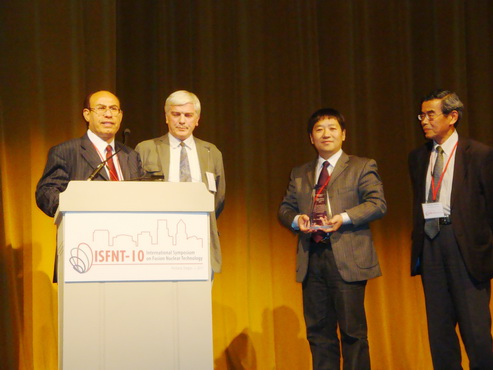|
In the evening of September 16th, at the working dinner of the 10th International Symposium on Fusion Nuclear Technology (ISFNT-10) in Portland, US, all attendees’ eyes were fixed on a young Chinese scientist. He was walking towards to the rostrum and going to accept the “Miya-Abdou Award for Outstanding Technical Contribution in the Field of Fusion Nuclear Technology” (MA-FNT Award) . This Chinese scientist is Dr. Song Yuntao, from ASIPP Tokamak Design Division, and this is the first time for this award presented to a scientist from China.
The award, according to Prof Mohamed Abdou, the honorary chair of ISFNT-10 conference, recognizes Dr Song’s “outstanding scientific contributions and leadership qualities in the field of fusion nuclear technologies including the EAST in-vessel components and DIII-D divertor.”
Holding the certificate plaque in his hands, Dr. Song said “It is with a deep sense of gratitude and humility that I accept this prize. I think this award is not just made to me as an individual, but to the excellent science and technology team of my institute.” He also thanked his family for their support and love.
Together with Prof. Abdou, H.Takatsu, deputy director-general of JAEA, chair of ITER JA DA and Dr. Luciano Giancarli, principal expert of ITER TBM plan presented the award. Academician Wan Yuanxi attended the meeting and witnessed the honorable moment.
About MA-FNT Award
The International Standing Committee (ISC) for the International Symposium on Fusion Nuclear Technology (ISFNT) has approved an award for Outstanding Technical Contributions to the Field of Nuclear Technology (FNT).
The title of the award is the Miya-Abdou Award for Outstanding Technical Contributions to the Field of Fusion Nuclear Technology (FNT). The award title is abbreviated as MA-FNT Award.
The award aims at acknowledging outstanding technical contributions to the field of Fusion Nuclear Technology at a young age. The technical contributions can be in any field that is within the scope of ISFNT. The award is intended for scientists and engineers at age 40 or younger.

|